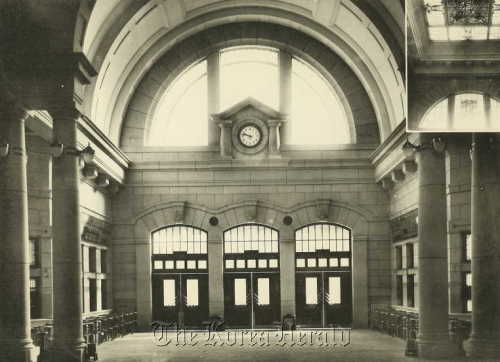The old Seoul Station building has been restored to the way it looked in 1925 and will open as a new culture space, Korea Craft and Design Foundation announced Thursday.
The station’s new name will be “Culture Station, Seoul 284” upon its opening in August.
Originally named Gyeongseong Station during Japanese colonial rule, the old Seoul Station was designed by Tsukamoto Yasushi of Tokyo Imperial University. It was opened in October 1925, and its name was changed to Seoul Station in 1947.
 |
The main hall of the old Seoul station in 1925 (Korea Craft & Design Foundation) |
 |
The old Seoul Station, which has gone through some two years of restoration to its original form, is shown on Thursday. (Yonhap News) |
The station was once the center of Korea’s capital as the first line of Seoul metro was opened in 1974, on top of the railways. Yet as express buses became popular after Korea’s major highways were launched, the station began to lose its stature in the 1990s.
The old train station building was vacated and left in disuse after KTX, Korea’s high-speed rail system, was launched in 2004 along with the new Seoul Station building.
“It was very much like a mercy killing,” professor Ahn Chang-mo of Kyonggi University, who was responsible for the 21.3 billion won restoration project, told reporters on Thursday. “This station could, and still can, fully function as a train station. It still has the rail tracks and the right facilities.”
It was the Ministry of Culture, Sports and Tourism ― which charge of the maintenance of the building in 2007 ― that decided to restore the building into its original form and establish it as a new cultural space. The project began in July of 2009 with Korea Craft and Design Foundation.
The newly restored building will be filled with cultural events, exhibitions, performances as well as seminars and conferences, the ministry said.
“Little information remains about Yasushi, who designed this building,” said Ahn. “From my research, though, I discovered that its architecture is very similar to the one of Luzern Station in Switzerland, which was built in the late 1800s. It has many traits of renaissance architecture ― especially the way its dome is designed.”
Ahn said that the culture ministry hopes to one day reopen the building as a train station, while keeping it as the culture space, since its facilities and rail roads have been well kept. “KORAIL (Korea Railroad Corporation) will have to agree with the ministry in order for this to actually happen,” said Ahn.
The old train station houses many rooms that are historically significant, including the VIP room where Korea’s former presidents were served while they were waiting for their train, and the large hall where one of the most high quality western restaurants in Korea was located during the Japanese colonial period.
“The Seoul Station was probably the only public space which Korea’s ordinary citizens and its president shared during the 1970s and ‘80s,” Ahn said. “And sadly, since this property is a national culture site, we cannot use the hall as a restaurant. But it will be filled with cultural events and exhibitions that are related to cuisine and dining.”
The ministry in April asked the general public to submit their suggestions for the new name of the train station building. Its official name ― “The Culture Station, Seoul 284” ― was selected from among 1,490 submissions. The winner reportedly included the number 284 as it is the building’s National Historic Site designation number.
“The Culture Station, Seoul 284” opens to the public on Aug. 9.
By Claire Lee (
dyc@heraldcorp.com)








![[Today’s K-pop] Blackpink’s Jennie, Lisa invited to Coachella as solo acts](http://res.heraldm.com/phpwas/restmb_idxmake.php?idx=644&simg=/content/image/2024/11/21/20241121050099_0.jpg)
